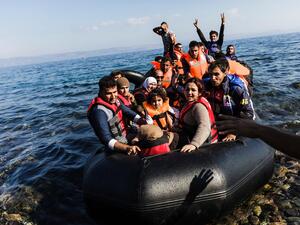Feature: Light returns to Black Mountain village as returnees rebuild homes
Feature: Light returns to Black Mountain village as returnees rebuild homes

Returnees unloading return kits in Tetovo, former Yugoslav Republic of Macedonia. UNHCR has helped 6,000 returnee families rebuild their homes.
TANUSEVCI, Former Yugoslav Republic of Macedonia (UNHCR) - A beacon of hope flickers in Tanusevci, a village on Black Mountain that locals call Skopska Crna Gora. For the first time since war broke out in the former Yugoslav Republic of Macedonia (FYROM), residents are back in the village - repairing homes, clearing landmines and planting crops that will see them through the coming winter.
Tanusevci used to be a ghost town. The first blasts of war over minority rights were fired in this village in February 2001, sending its 1,000 ethnic Albanian residents fleeing across the mountains for the Serbian province of Kosovo.
As the war spread to other parts of the country, 180,000 people abandoned their homes. About 80,000 of them sought shelter with their ethnic Albanian kin in Kosovo, 20,000 fled to neighbouring countries, while the rest were displaced within FYROM.
In August 2001, an internationally supervised peace accord was signed. Subsequently, a firearms collection programme was successfully conducted. The UN refugee agency was called upon to help build confidence in the peace process and provide assistance to those who had been uprooted.
By last count, all of those who had fled their homes were back in their villages, except for more than 8,000 internally displaced and another 3,000 refugees remaining in Kosovo.
"The return, particularly of ethnic Macedonians and Serbs to villages where they are in the minority, is more daunting, more challenging," says Amin Awad, UNHCR's representative in FYROM. "We do not want to push it too hard unless we are certain that these people can live in harmony with their neighbours."
While ethnic Albanians have steadily gone back to villages they had abandoned, the return to Tanusevci was more complicated. FYROM security forces viewed the area as militarily sensitive. Returns were not authorised until midsummer this year.
This October, security forces pulled out from a school they had used as barracks in Tanusevci. An operation to clear the area of landmines and unexploded ordnance followed. All but about 50 of the estimated 1,000 ethnic Albanian residents have already gone back to the village.
Today, blue plastic sheeting showing the UNHCR logo covers damaged roofs and walls of houses in Tanusevci, composed of several small hamlets scattered over a hilly landscape. On a sunny day, the scenery is peaceful and idyllic.
"I came home as soon as the military allowed us to return," says Ilaz, a 70-year-old farmer. He is back with his five sons, their wives and a grandchild. "My house is damaged but I had some tiles and I have already repaired parts of it. Some men from UNHCR came and made a list of what I needed in order to repair the rest. The material looks good. I am very grateful."
On October 31, the UN refugee agency distributed its final shelter kits to the returnees at Tanusevci - the last beneficiaries of the agency's programme to provide emergency assistance to people whose houses had suffered minor damage. A total of 150 shelter kits were distributed there.
In all, UNHCR has helped repair minor damage to 6,000 houses in FYROM over the past year. The agency's shelter assistance includes the provision of timber, door and window frames, lime, bricks, tiles and electrical fuse boxes and switches.
In September, the refugee agency handed over to the European Union and the International Management Group co-ordination for the repair of around 1,500 heavily-damaged houses - a challenging process that requires extensive surveys and co-ordination with government agencies.
As the security situation in FYROM continues to improve, UNHCR is gradually phasing out its confidence-building programmes. Its bus services, designed to assure freedom of movement in the conflict zones, are now down to eight lines from 13 lines. The plan is to close down another two lines in the next few weeks as the situation continues to normalise.
The agency has also completed or is about to wind down its 130 quick impact projects (QIPs), which aims to benefit mixed communities through the repair of schools and clinics, water facilities and community buildings.
Meanwhile, families of ethnic Albanians still in Kosovo have been visiting Tanusevci to look at possibilities for return. Valon, a nine-year-old boy, says: "Our house is destroyed. We will come home next summer when the house is rebuilt."
For those who have returned and settled down, the main concern is food for the winter. "We came too late for the planting season," says Ilaz. "How difficult life will be in the coming months depends on nature. Old people say that if the flowers blossom late in autumn, winter will be tough."
Pointing to the flowers on the ground, he adds, "Look at them. Nature is saying that his winter will be harsh. The future is now all in the hands of God."
By Brita Helleland
UNHCR Skopje









